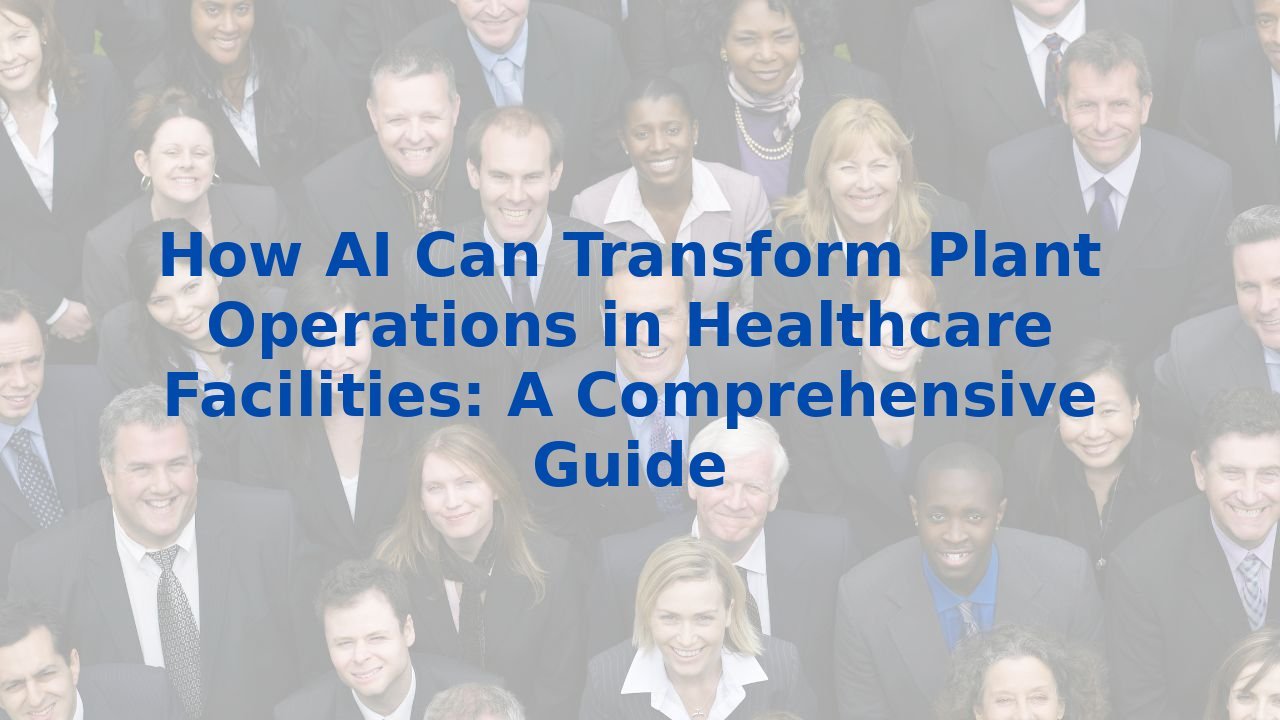How AI Can Transform Plant Operations in Healthcare Facilities: A Comprehensive Guide
How AI Can Transform Plant Operations in Healthcare Facilities: A Comprehensive Guide
In the complex world of healthcare, where every second counts, the efficiency of plant operations is paramount. Within this environment, the Plant Operations team is responsible for maintaining the infrastructure that supports healthcare delivery, ensuring that systems run smoothly, effectively, and safely. The application of Artificial Intelligence (AI) is rapidly changing the landscape of these operations, offering incredible potential to enhance efficiency, bolster safety protocols, and improve overall patient care.
Automating Routine Tasks
One of the most profound impacts of AI in healthcare facilities lies in the automation of routine tasks. Think about it—maintaining equipment schedules, tracking inventory, and processing data related to operational performance can be daunting. Enter AI-powered systems. These advanced tools can rapidly analyze vast datasets, delivering insights that facilitate informed decision-making. For instance, predictive analytics can highlight potential equipment failures before they occur, allowing teams to conduct proactive maintenance, thus minimizing downtime. This not only saves precious time but also significantly reduces the likelihood of human error, ensuring that critical systems are always in optimal working condition.
Optimizing Processes
Beyond automation, AI excels in process optimization. By scrutinizing workflows, AI systems can pinpoint bottlenecks and inefficiencies that may disrupt operations. Armed with this knowledge, organizations can restructure these workflows to eliminate redundancies, leading to a leaner and more cost-effective operational framework. A prime example of AI in action is its ability to streamline communication between departments, ensuring that maintenance requests are processed swiftly and without delays. The cascading effect of this optimization translates not only to faster task completion but also to an overall more agile organization.
Enhancing Safety
In healthcare facilities, safety is non-negotiable. AI emerges as a robust ally in maintaining high safety standards. By automating complex tasks that are often prone to human error, AI helps safeguard both employees and patients. For example, AI-driven quality control systems can oversee crucial manufacturing processes in real-time, catching defects or irregularities early on. This vigilant monitoring ensures that equipment meets stringent safety standards, ultimately reducing the risk that substandard items could affect patient care.
Predictive Maintenance
Another remarkable application of AI in healthcare is through predictive maintenance. By leveraging historical data coupled with real-time operational metrics, AI can forecast potential equipment failures with incredible accuracy. This proactive approach not only curtails downtime but also mitigates associated operational costs, ensuring that essential systems are functional when needed most. In a healthcare setting, prompt resolution of maintenance issues is critical, as it minimizes disruptions to patient care and enhances the overall patient experience.
Employee Training and Productivity
As helpful as AI can be in automating tasks, it shines just as brightly in the realm of employee training and productivity enhancement. AI-driven learning platforms have the unique ability to customize training materials based on individual learning styles, significantly boosting knowledge retention and engagement. Additionally, these systems can provide real-time support to employees, offering relevant resources or immediate solutions to questions that may arise. This synergy between AI tools and human expertise creates an environment where staff members can operate more efficiently and effectively.
Benefits of AI Training
However, to truly unlock the potential of AI, investing in training programs for employees is imperative. Teaching staff how to effectively collaborate with AI systems ensures they harness the technology's full capabilities, ultimately driving substantial improvements in efficiency. When employees understand how to leverage AI tools within their workflows, they not only streamline processes but also contribute to an agile work environment ripe for innovation. This investment in human capital pays dividends, empowering employees to focus on high-value activities that can propel the organization’s vision and objectives forward.
Conclusion
By integrating AI technology into plant operations, healthcare facilities can realize significant enhancements in operational efficiency, safety, and patient care. From automating mundane tasks and optimizing operational processes to enhancing safety protocols and improving predictive maintenance, the benefits of AI are vast and profound. The future of healthcare demands a shift not just in technology, but in how we train and empower our workforce as well. By investing in comprehensive AI training, organizations can cultivate a culture of innovation and adaptability, equipping their teams to navigate the evolving landscape of healthcare with confidence and skill.
In a world where every decision matters, embracing AI isn't just an option—it's a necessity for those committed to delivering the highest standards of care and operational excellence.



